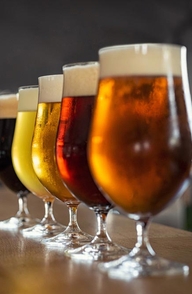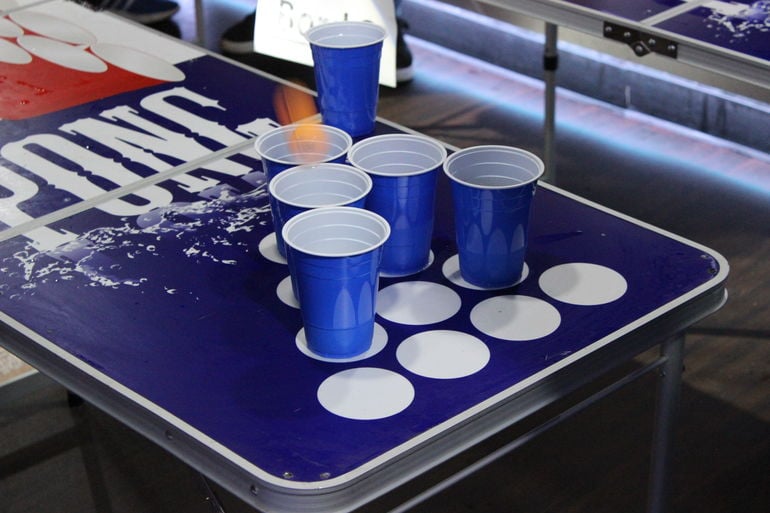Start 14-Day Trial Subscription
*No credit card required

What Is the Origin of Beer Pong?
Beer Pong Makes a Racket Without a Racket
Studying in college is not just about spending sleepless nights over books and looking for college paper writing services. Every student will tell you about loud parties, awesome trips during summer and spring breaks, and new best friends. During one of those parties, one extremely popular drinking game was born.
Beer pong is an alcoholic game in which players throw a ping-pong ball across a table into a mug or a glass of beer standing on the other side of the table.
The game is usually played by two teams, each with ten cups or glasses of beer placed in the form of a triangle on the edge of the table. During the game, each team takes turns trying to land their ball in the opponent's cups. If the ball eventually makes it into the opposing team's cup, the contents of that cup are consumed by the “receiving” team, and the cup is removed from the table. The winner is the team that first "strikes off" all the opponent's cups.
But how did it start? According to stories, in the 50s and 60s, students from Dartmouth College played ping-pong in the basement, sipping beer that was on the table. One of them was Crispus Knight, an author of "Three for Ship: A Swan Song to Dartmouth Beer Pong". He was talking on the phone with his friend, living in Brooklyn when he mentioned that one could aim at the cups and involve this in ping-pong. There were many variations of the game based on the same tradition: using a racket to hit the ball so it would hit the cup and cause the opponent to drink their beer.
Beer pong spread to other colleges just as fast as rumors fly in a tiny neighborhood. Knight compares the spread of beer pong to a game of a Telephone. The game with the racket reached Pennsylvania, a student organization at Lehigh University called "The Hill". In February 1979, when the word "beer pong" first appeared in the student newspaper "Brown and White", it was a Dartmouth version of the game. But by the 80s, the winds of change were threatening Pennsylvania's sovereignty in the world of beer pong.
"Throwpong", a game that didn't need rackets, was on the rise. One way or another, throwing a ball without a racket was a serious event. It was a quicker and more beer-focused game, and if you played this game, you were guaranteed to get drunk.
At that time, drunk students in Pennsylvania were browsing the headlines looking for a name for their game, wanting to separate it from the Dartmouth version of beer pong. According to a 1986 graduate of Lehigh University, they had "an analogy between the idea of how a ping-pong ball flies over a table and lands on the enemy side and the idea that the United States would bomb Beirut" in retaliation to the 1983 bombing. Three years later, the Hill tried to name the game "Libya" after the U.S. military operation against Libya in 1986, but the second syllable in the word "Libya" was too difficult to pronounce for drunk people. When Lebanon was again in the spotlight of the tabloids because of the Iran–Contra affair, the anti-Lebanese sentiment took over again. The racket-less version of the game previously referred to as "throwpong" received the name of Beirut.
At that time, Beirut was spreading at a tremendous speed, primarily through the northeastern student dormitories. Some say that after Bucknell and Lehigh Universities, Beirut took over Moravian College. Others argue that Fairfield University, located between New Hampshire and Pennsylvania, was next.
With the help of an association of eight American universities called the Ivy League, Beirut was ahead of the regional Dartmouth beer pong in terms of popularity because it is "simpler and easier." And it's true: the Dartmouth game involving rackets featured the devilish combination of strict restrictions and specialized equipment that were available only to some people. The Beirut game requires only a flat surface, moving limbs and a primitive notion of geometry. Today, Beirut and beer pong are synonymous, though the term beer pong is more widely used.
It is difficult to determine the exact stages of conquest, but by the end of the 20th century, Beirut had become the main student alcoholic version of the game. And, as it turned out later, an excellent opportunity for business development, leading to the founding of a prestigious competition involving what we know as modern beer pong.
In early 2006, the annual Beer Pong World Championships were launched in Mesquite, Nevada. Everybody was laughing when they had heard about the grand prize of $10,000. No one believed the championship would actually happen. Beirut was by far the most common student game, but would adults agree to pay money to throw projectiles in a glass of light beer in some building 80 miles northeast of Las Vegas?
This previously unpopular variation of the Dartmouth racket game has now become the driving force and has started to grow faster and faster. Nowadays, according to a review, more than half a million dollars has been awarded as a prize, and 100 thousand dollars have been earned from sales of branded tables, glasses, and other equipment.



